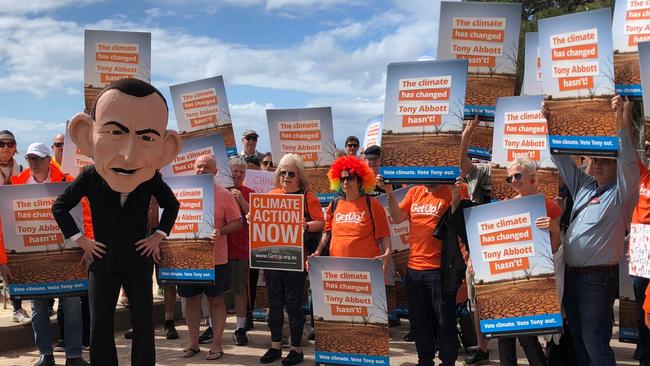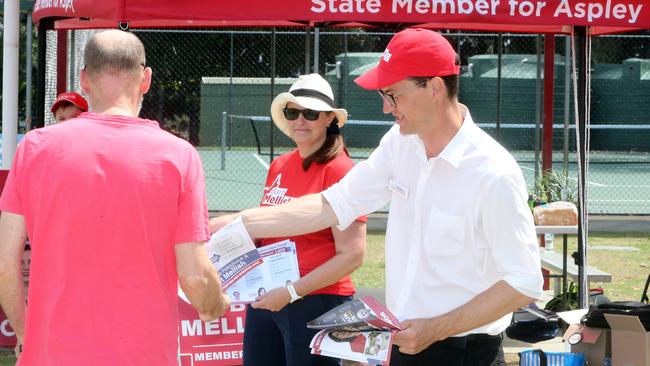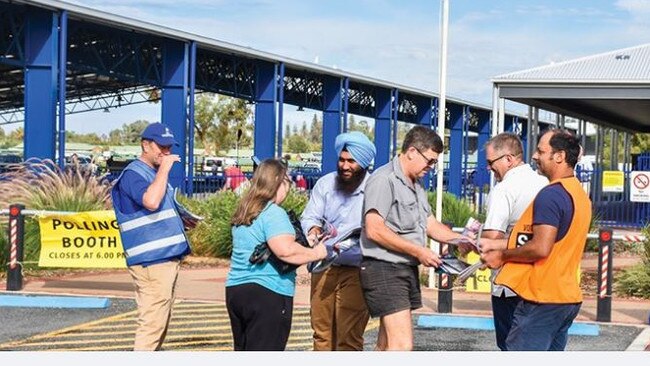Rising public disengagement heralds crisis in democracy
As trust in institutions declines, people are turning away from mainstream political parties.

A generation ago, Robert Putnam fired up political analysis with a journal article about the decline of social capital in the US. That 1995 paper, Bowling Alone, used the motif of ten-pin bowling to describe the fraying of group connections and social networks, built through membership of political parties, trade unions, sporting and community groups, and the norms of reciprocity and trust that arise from them.
America is divided, blue states and red states, and bedevilled by COVID-19. Politics there is noisier and wears a scowl. Social exchange finds its various forms on the internet more easily than on the streets or halls. The apotheosis of this, of course, is Donald Trump, president-reject, pumping out #sad tweets. The next monster monograph in poli sci can’t be too far away: Trolling Alone.
In Australia, our thinkers found in Putnam a way to explain a range of local maladies, including a decline in trust in government, growing social isolation and diminishing life satisfaction. Ever since, digital technology has changed our connectedness, for good and ill, while disrupting our institutions, end to end.
Australians are no longer joiners, in the way we were in the 1960s, even the 80s. Card-carrying membership of political parties has plunged from the heyday of the pre-war years, as has trade union density, regular church attendance and participation in groups such as Rotary.
That’s in line with a new social survey by the Australian Bureau of Statistics that shows active involvement in political and civic groups has tumbled from 18.7 per cent in 2010 to 9.4 per cent last year. Only 7 per cent of those aged under 24 are participating in political parties, trade unions or human rights, animal welfare and environmental groups.
If anything, the malaise has deepened, settling into something more worrying — a crisis of democracy. In assessing last year’s federal poll the Australian National University’s Sarah Cameron and Ian McAllister noted many indicators from the Australian Election Study pointed to citizen detachment from the major political parties, including record low political partisanship, rising voter instability and voter distrust in government, which is at a record low in a survey that began in 1987.
McAllister tells Inquirer “the election campaign as we know it is almost dead”. It’s due to a “perfect storm of social change and technology”, produced by increased rates of university education and political engagement via the internet. “Young people are just not involved in traditional party politics,” he says. Yet despite a falling share of the vote and the rise of other players, the “cartel” of the major parties retains its hold on our parliaments through the power of incumbency.
After surveying a representative sample of more than 2100 voters after last year’s poll, the authoritative AES not only put the contest between Scott Morrison and Bill Shorten into historical context, it confirmed the rise of new trends. These days more people are contacted by candidates electronically and follow election news on the internet, with 42 per cent of those surveyed accessing the sites of mainstream media.
But the AES shows a growing disengagement. While 74 per cent of those surveyed discussed politics during the 2019 campaign, only 18 per cent tried to persuade others how to vote; in 1993, when a seemingly down and out Paul Keating held off a GST-toting John Hewson, the relevant figures were 88 per cent and 49 per cent.

Active involvement in last year’s campaign was stuck in a long-term groove of a mere 2 to 5 per cent in attending meetings or contributing money to a party or candidate. Working for a party or candidate peaked in 2007 at 12 per cent, when Kevin Rudd ended John Howard’s political career, and has averaged 9.5 per cent across the subsequent four polls.
Outside of elections and the occasional industrial-scale branch stacking to steamroll preselections, major parties are drifting to be niche operations, at the mercy of rusted-on supporters. Labor had 150,000 members in the 1930s but dropped to half of that by the 50s split; Australia’s population has tripled in the past 70 years.
In 2010, ALP membership plateaued at 42,800. It is understood numbers are now at 60,000, close to levels recorded when Keating was in the Lodge, although way down in per capita terms. Greg Brown reported in August that Labor would have to campaign at the next election, likely to be in early 2022, with $15m less than its funding war chest last year.
The Liberal Party claims to have 80,000 members in more than 2000 branches. According to members in their 20s contacted by Inquirer, branch meetings can be moribund, social gatherings for the over-70s. “They’re the lifers,” says a party member who works for a Liberal MP. “You admire their staying power but you have to wonder — what’s the point?”
Echoing Oscar Wilde’s wry observation about why socialism was doomed, the Liberal staff member says young people just don’t want to give up their evenings. “Politics is not very sexy at this level. My own belief is that you have to find a way to get involved, otherwise you’re not entitled to complain about the state of the world.”
Political scientist Anika Gauja says the fall in measured involvement is due to “increasing levels of disaffection with political institutions and traditional advocacy groups, coupled with people’s changed preferences to participate in politics on the basis of issues and on an ad hoc basis”.
“Campaigns are on the rise while organisations are declining,” says the University of Sydney associate professor. “People are no longer as motivated by ideology, and their longstanding attachments to political parties and other political organisations that are seen as traditional are weakening. Citizens now prefer to participate in campaigns for particular issues that affect their lives rather than for abstract causes. They dip in and out of political activity, depending on their time, resources and level of interest.”
Gauja studies the internal dynamics of parties around the world. Most members don’t participate actively in them. “There are around 10 per cent of party members though who are incredibly active; they volunteer, campaign, donate, attend meetings and publicise the party’s cause. They are the political junkies. They are motivated by the party’s cause but they also enjoy doing politics — sometimes it’s the power that politics brings, sometimes it’s the social benefits and sense of belonging and sometimes they are motivated by the desire to help the community.”
Political sociologist Ariadne Vromen says traditional organisations are in decline “because they do little to actually engage members beyond ask for their membership fees”. She says surveys don’t capture the new forms of political action. “Most people have episodic involvements with political groups now that might mean going to a meeting, signing a petition, engaging in an online discussion or making a donation,” says Vromen, who is chair of public administration at the ANU’s Crawford School.
“It is ‘digital first’ as a port of call for most people when they want to express themselves politically, to have a say and make a difference.”
Vromen studies groups that have emerged to engage citizens, including GetUp, which claims 1.4 million members although its governance is opaque. Last year GetUp dispatched 9000 people into the field on election day. According to evidence to parliament, the progressive group’s volunteers made 712,000 telephone calls to neighbours during the campaign.
The ANU’s McAllister argues parties have become lazy in some respects because of our institutional settings, especially compulsory voting. “The function of parties is to mobilise and convert, to win elections and hold power,” he says, although it could be a “chicken and egg” proposition. The big players have become vehicles for patronage, are risk-averse and resistant to reforms that could broaden their base and improve democracy. Voters increasingly see the system as rigged in the interests of big parties. McAllister suggests term limits, recall elections (where voters can oust a representative before their term expires) and party primaries. These are seen as impractical, even outre, by our political class. Yet without some improvements, he says a “populist upheaval is what you risk”.
“We see it in the Australian Election Study, mirroring attitudes in the US and UK, although not as much as in France and Hungary, with voters saying the system doesn’t serve their interests. Populism is out there and at some stage it’s going to come to the surface.”
Gauja argues parties need to change the way they interact with citizens and their expectations of members. “We know that party membership is around 5 per cent of the electorate but that a much greater proportion of people engage with parties in other ways, by for example following them or party leaders on social media,” she says. “To survive, parties need to be more flexible in the ways in which they organise and harness support. This might be getting rid of the idea of membership altogether in favour of a political movement, as the Canadian Liberals did, or it might mean co-operating more with grassroots’ citizens campaigns. Either way, there is an untapped reservoir of people out there who are interested in politics and practise it every day. They’re just not the sort of folk who join parties.”

Vromen says parties should listen to and engage citizens on the issues that matter to them and demonstrate citizen input is vital to their policy and decision-making. She points to an innovation by the University of Canberra’s Centre for Deliberative Democracy and Global Governance. In September it organised face-to-face and virtual town halls with Labor’s Andrew Leigh, who represents Fenner in the ACT, and constituents to discuss mitochondrial donation. The assisted reproductive technology, which might reduce the risk of a child inheriting a rare disease from a carrier of the genes that cause the condition, is prohibited here. The issue is due for a conscience vote in parliament.
“What struck me was there was a real hunger to deal with this in detail and not sound bites,” Leigh says of the experience. “It’s in stark contrast to the shouty, nasty, zero-sum politics that can characterise climate change.” He says the idea is to eventually cast a vote that is informed by experts and community expectations. Leigh wishes he’d gone through a similar educative process on marriage equality. “These exercises in deliberation push back against the trend of political hobbyism, in which we might go along and see our team play and cheer for them and against our opponents, but we’re not trying to persuade anyone. In this process everyone is engaged.”




To join the conversation, please log in. Don't have an account? Register
Join the conversation, you are commenting as Logout